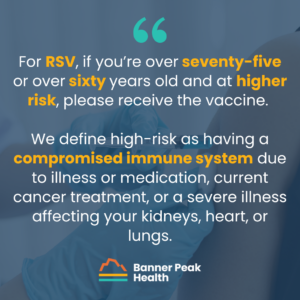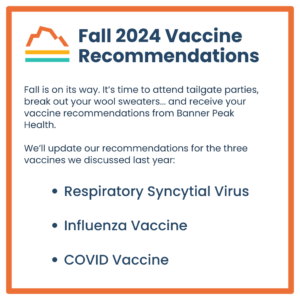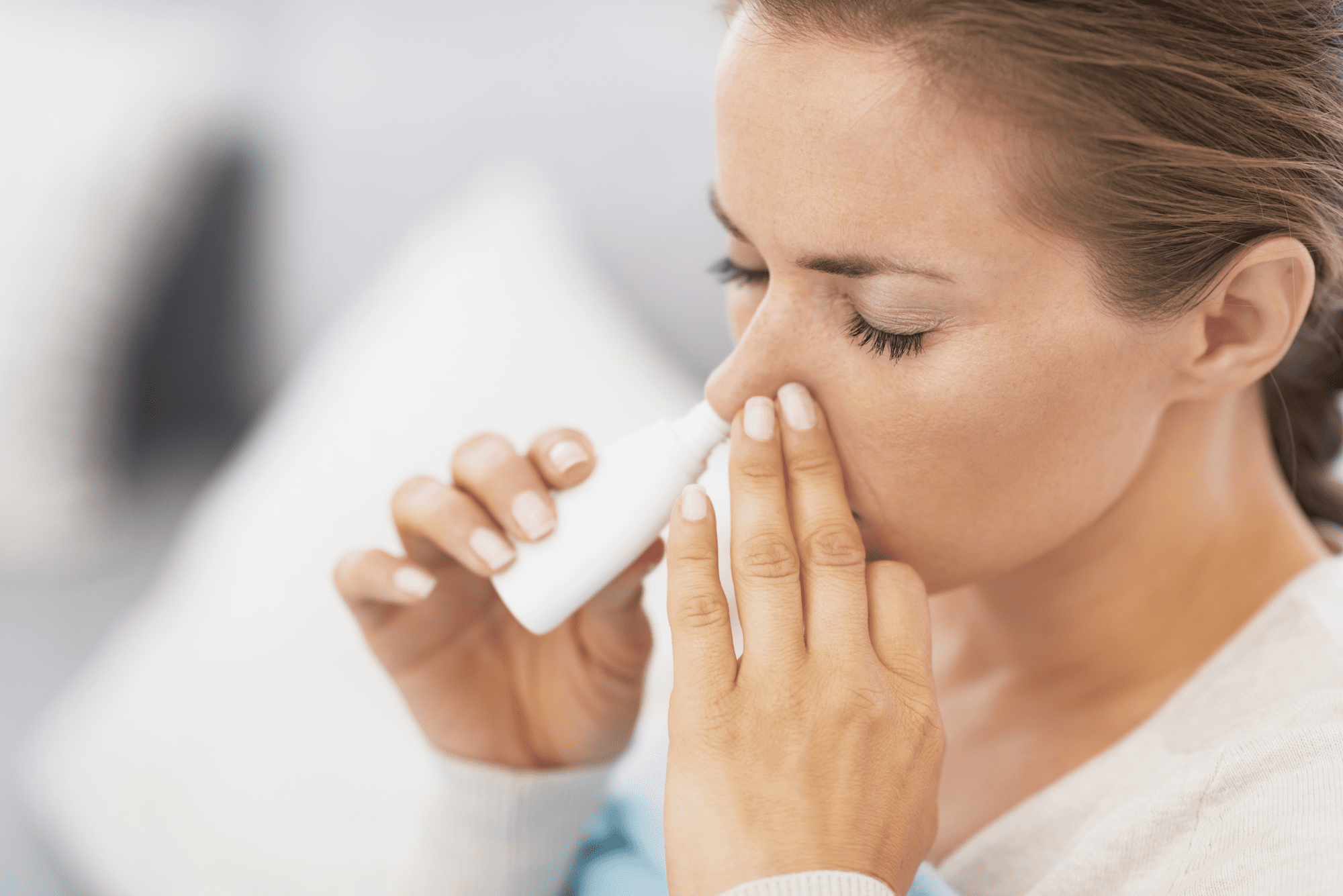Fall is on its way. It’s time to attend tailgate parties, break out your wool sweaters… and receive your vaccine recommendations from Banner Peak Health.
We’ll update our recommendations for the three vaccines we discussed last year: respiratory syncytial virus (RSV), influenza, and COVID.
Respiratory Syncytial Virus
Last year, we were tentative about the RSV vaccines: Abrysvo by Pfizer and Arexvy by GSK. The initial randomized controlled trials showed a reduction in symptom burden but failed to demonstrate a reduction in hospitalizations and deaths.
We were also concerned about the higher rates of two potentially fatal autoimmune central nervous system diseases: Guillain-Barré syndrome and acute disseminated encephalomyelitis.
These very rare complications occurred in 1 out of 7,500–15,000 study participants. This rate is much higher than usual than in other vaccines, such as influenza and Shingrix (shingles).
We didn’t support drug companies’ recommendation that “everyone over sixty years old” receive the vaccine. We advised that only high-risk individuals over sixty years old and their close contacts receive the vaccine as we wait for more data.
A year later, we still don’t have randomized controlled trials or epidemiological studies documenting a reduction in death or hospitalization from RSV. It may be too soon for those studies to be completed.
Regarding the risk of Guillain-Barré syndrome (GBS), the Centers for Disease Control (CDC) reported estimated rates for over 10 million people who received the vaccine from August 4, 2023, to March 30, 2024: 4.4 per million for Abrysvo and 1.8 per million for Arexvy.
The CDC didn’t mention the rates for acute disseminated encephalomyelitis, another neurological autoimmune illness seen in the original vaccine trials.
Given the limitation in the study methodology, the GBS rates probably underestimated the actual rates of the side effects. The rates are markedly lower than those in the original studies but still above the baseline in an unvaccinated population.
It’s reassuring that the vaccine appears safer than we thought last year. However, we still lack data demonstrating reduced hospitalization and death rates.
We still disagree with Pfizer and GSK’s recommendation that everyone over 60 receive the vaccine. We do agree with the CDC’s recommendations:
- Everyone aged 75 and older receive the RSV vaccine.
- People ages 60–74 at increased risk of severe RSV, meaning they have certain chronic medical conditions such as lung or heart disease, or they live in nursing homes, receive the RSV vaccine.
This recommendation is for adults who did not get an RSV vaccine last year. The RSV vaccine is not currently an annual vaccine, meaning people do not need to get a dose every RSV season.
Eligible adults can get an RSV vaccine at any time, but the best time is in late summer and early fall, before RSV usually starts to spread in communities.
Influenza Vaccine
No controversy here. We have solid evidence that influenza vaccination reduces the risk of illness, hospitalization, and death for children and adults. Therefore, we recommend it for everyone.
We recommend that you wait until October to receive your influenza vaccination. A slight delay ensures the vaccine’s three to four months of peak protection come a bit later into the flu season, which peaks late in California and can last through April/May.
However, if you plan to travel in October, receiving the vaccine in September is okay to ensure adequate time to respond to the vaccine before traveling.
This year, we have a supply of Flublok, our preferred influenza vaccine for those under age 65 or anyone allergic to traditional vaccines. We prefer Flublok over other quadrivalent vaccines because it’s less allergenic (not grown in eggs) and more potent (it contains more hemagglutinins than the standard quadrivalent flu vaccines offered in pharmacies).
As in previous years, we have the Fluzone High-Dose vaccine for individuals 65 and over or immunocompromised.
COVID Vaccine
The CDC has transitioned its COVID vaccine program to resemble that of influenza, with an annual booster recommended in the fall based on the most current circulating variant.
We agree with this approach. Unfortunately, COVID isn’t going to disappear. But as humans acquire immunity from repeated infections and vaccinations, the disease’s severity will diminish over time.
Unfortunately, COVID infection still represents a risk for stroke, heart attack, long COVID, hospitalization, and death. Those at higher risk represent most of COVID’s bad outcomes.
We differ from the CDC in assessing who should receive an annual COVID vaccine booster.
The CDC recommends an annual booster for everyone over six months of age. Because autoimmune complications of COVID occur more often (but still rarely) in young people and bad outcomes occur more in older people, we recommend the annual booster for those who are over fifty or have risk factors for a bad outcome.
These risk factors include a prior history of severe COVID infection, heart or lung disease, obesity, cancer, and diabetes. Get in touch with us if you’re unsure of your status.
The West Coast is seeing a surge in COVID cases. Many of you had COVID over the summer. A COVID infection exposes your immune system to the most current COVID variant.
If you had COVID recently, you can wait (at least) three months before receiving a COVID vaccine. Your COVID infection will give you an immune boost.
The 2024–2025 COVID vaccine targets the KP.2 strain, a great-great-great-etc.-grandson of the Omicron variant. The vaccine will be available at local pharmacies in the next few weeks and comes in three forms:
- Moderna mRNA vaccine
- Pfizer-BioNTech mRNA vaccine
- Novavax protein subunit vaccine
The CDC has approved all three.
The Novavax vaccine has been associated with fewer side effects, but the Moderna and Pfizer vaccines have more robust evidence of efficacy.
If you’ve had a particularly bad reaction to a mRNA vaccine, we recommend a Novavax vaccine. Otherwise, choose from the mRNA vaccines. You don’t need to choose the same manufacturer as you did for previous boosters.
Receiving Multiple Injections at Once
Emerging data shows that receiving an influenza and COVID vaccine simultaneously doesn’t cause appreciably more side effects and can reduce the total amount of time feeling “off,” meaning you can get all your vaccines in one sitting and “just get it over with.”
On the other hand, because the RSV vaccine is new and we’re still learning about its side effects, we don’t recommend combining it with other vaccines.
In Summary
For RSV, if you’re over seventy-five or over sixty years old and at higher risk, please receive the vaccine. We define high-risk as having a compromised immune system due to illness or medication, current cancer treatment, or a severe illness affecting your kidneys, heart, or lungs. If you are uncertain about your status, contact us. Most pharmacies have the RSV vaccine available by appointment.
For influenza, please wait until October to ensure your maximum antibody levels remain effective throughout flu season. You can be vaccinated at a pharmacy or in our clinic later in the fall. It’s okay to receive the flu vaccine in September if you plan to travel in October. Contact our office directly to schedule your flu shot.
The 2024–2025 KP.2 variant vaccine for COVID will be available soon. Please get this vaccine if you are over fifty years old or have risk factors for a bad outcome. If you recently had COVID or an earlier COVID vaccination, you can wait three months before getting this vaccine. Our office will not have the COVID booster; please contact your local pharmacy to set up a COVID vaccine appointment.

Best of Health,
Dr. Waheeda Hiller
Dr. Lindsay Klein
Dr. Barry Rotman

Barry Rotman, MD
For over 30 years in medicine, Dr. Rotman has dedicated himself to excellence. With patients’ health as his top priority, he opened his own concierge medical practice in 2007 to practice medicine in a way that lets him truly serve their best interests.




